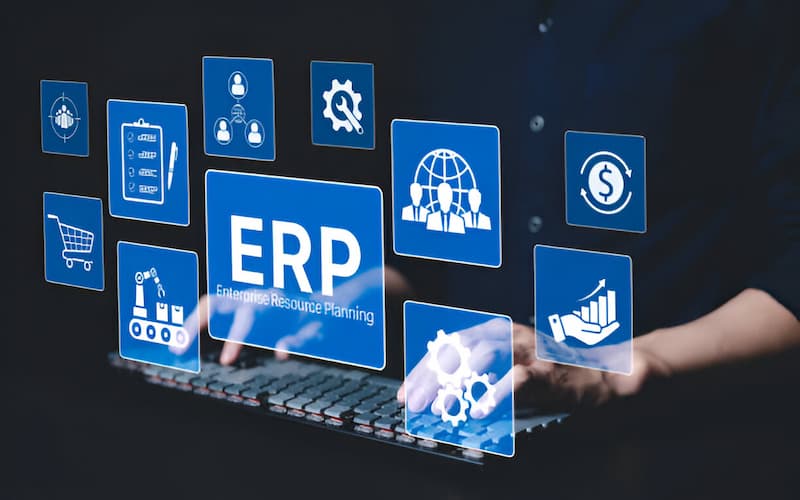In the current dynamic business environment, organizations are discovering that financial management is not all about crunching the numbers, it is all about having actual accounting efficiency in Saudi Arabia. Businesses are constantly challenged by staying up to date with VAT regulations, as well as having to handle large volumes of transactions. The Saudi market is highly competitive and requires high speed, accuracy and compliance, which the traditional methods cannot provide.
This is where the ERP solutions come in. ERP systems enable organizations to enhance their business operations by integrating accounting functions with other business processes to streamline processes, eliminate errors, and make better decisions. By implementing sophisticated ERP software in Saudi Arabia, businesses are able to establish a strong platform that will support growth and at the same time experience financial transparency and operational excellence.
Here are The Role of ERP in Streamlining Saudi Arabian Accounting
1. Automation of Manual Processes
ERP removes the tediousness of routine accounting procedures like data entry, processing invoices and reconciliation. Automation can not only minimize the human error but also provide time to the finance teams to work on strategy. This transition makes businesses run more efficiently and allows accountants to concentrate on tasks that provide real value and not be held up by routine tasks.
2. Compliance Made Easier
It is important to remain compliant with the tax laws of Saudi Arabia, such as VAT, to avert penalties. The ERP solutions make this process very easy by auto-applying tax rules and producing correct and compliant reports. This minimizes the possibility of making mistakes and businesses are well on the same page regarding legal requirements. Compliance managed in the system also relieves business leaders of stress during audit or inspection.
3. Real-Time Reporting and Insights
ERP systems allow real-time access to financial information in the form of dashboards and real-time reports. Managers no longer have to wait until the end of the month to learn about expenses, revenue, and cash flow, they can monitor it as it occurs. These prompt insights assist business leaders in making proactive decisions, adjust to the changes in the market, and capture new opportunities within a short period of time. It is all about financial clarity when it is most needed at all.
4. Improved Cash Flow Management
Cash flow is one of the most tricky aspects to manage in business. ERP systems also track payables and receivables in real time so that payments are tracked efficiently. Improved visibility on financial obligations enables companies to plan, eliminate unwarranted delays and ensure a healthy liquidity position. ERP tools assist in cash flow management which in turn makes businesses sustainable and competitive in the Saudi Arabian market.
5. Integration with Other Business Functions
ERP is not a stand-alone system, it is a combination of accounting and sales, procurement, inventory, and HR. Such integrated system will provide data consistency across departments when a free flow of information occurs, less duplication of effort and more accuracy in decision-making occurs. Integration also increases cooperation between departments, and the whole organization will be more connected and aligned with the same goals.
6. Scalability for Growing Businesses
As businesses expand, there will be an increment in the accounting complexities. The basic idea behind building the ERP systems is that they are constructed in such a way that they can expand according to the growth of the company in terms of increased transactions, branches and compliance requirements. This scalability eliminates the cases of businesses having to switch between systems. Instead, they can find a long lasting solution which they can expand and it rise to meet them.
7. Enhanced Security and Data Accuracy
Financial information is sensitive and its protection is important. ERP systems provide highly secure options like role based access, data encryption and frequent back ups. These precautions minimise the chances of fraud or loss of data. Simultaneously, ERP guarantees the accuracy of the data by reducing manual input, and bringing all information on a single platform to provide businesses with a sense of relief and accurate financial records.
8. Better Decision-Making Capabilities
Consolidation of real-time financial information and reliable information enable business leaders to use it in making business decisions. The analytics and forecasting capabilities in RP allow providers to uncover trends, opportunities and threats. Leaders are also in a position to make evidence-based decisions unlike guessing and this directly contributes to the company goals. The high quality of decision making will enable business to thrive in a very competitive business environment in Saudi Arabia.
Conclusion
ERP solutions are not optional anymore and they are the key to the sustainable accounting efficiency in Saudi Arabia. ERP helps companies automate processes, make compliance easier, and offer real-time business insights to empower them to streamline operations without sacrificing accuracy and reliability in their financial systems.
With Saudi Arabia already in the process of digital transformation, companies that adopt ERP will be in a better position to grow, innovate and compete. By adopting the proper system, such as Quickdice ERP, companies can rise above accounting obstacles and take advantage of new opportunities, and long-term success will be achieved because of financial strength and efficiency.



